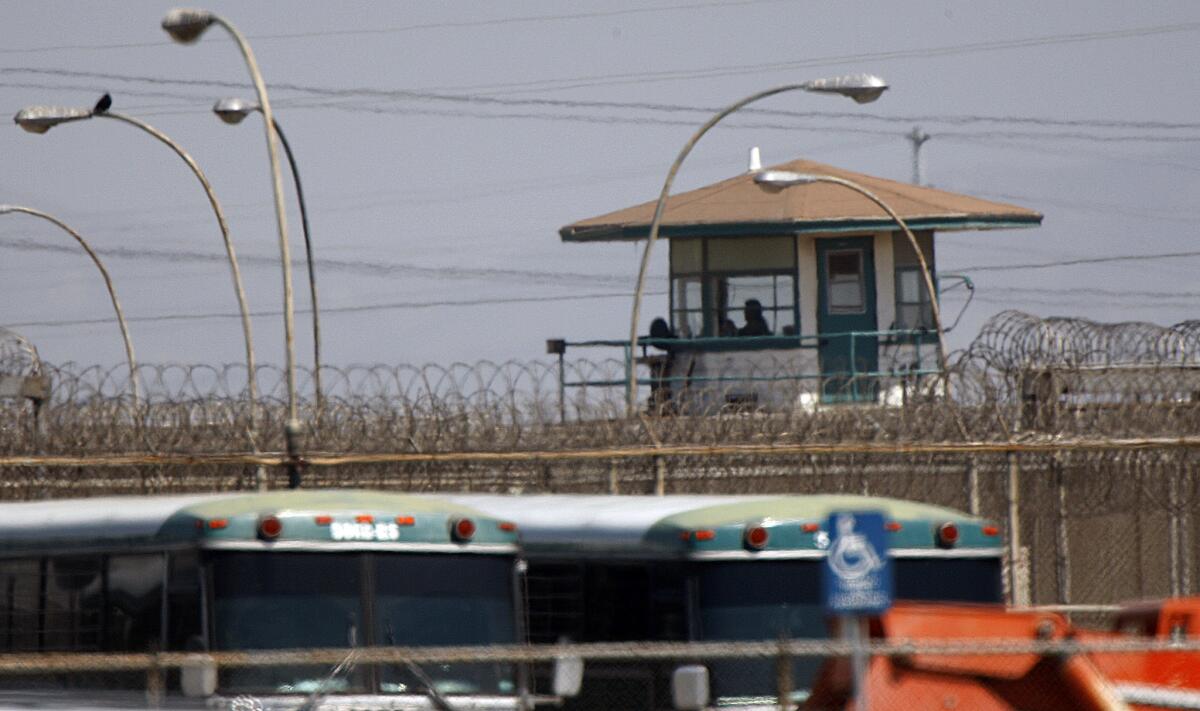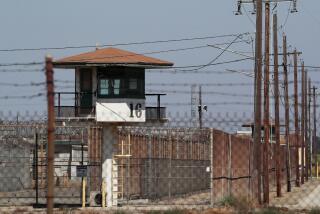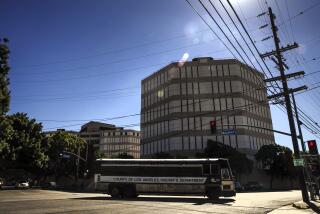Nearly 1,000 infected at Chuckawalla Valley State Prison in worst coronavirus outbreak to hit prison system

- Share via
In three weeks, Chuckawalla Valley State Prison has gone from having zero confirmed cases of COVID-19 to 993, the worst coronavirus outbreak to hit the California prison system to date.
About 44% of the 2,256 men incarcerated at Chuckawalla, which sits on the eastern edge of Riverside County, have tested positive for COVID-19, the disease caused by the novel coronavirus, according to figures published by the state prison system.
While no inmates have died at Chuckawalla, the virus has spread swiftly: Before May 15, no inmate had tested positive for COVID-19, according to Dana Simas, a spokeswoman for the California prison system. Nearly 1,000 have been infected since. Every case remains active.
By comparison, the California Institute for Men in Chino, where 12 inmates have died, has recorded 759 total cases of COVID-19, 521 of them still active.
Chuckawalla houses about 2% of the state prison system’s institutional population but accounts for 40% of its active cases of COVID-19, according to state prison figures.
“We didn’t bring this on ourselves,” Michael Duran, an inmate who has tested positive for COVID-19, said in a telephone interview. “It came to us.”
Upon learning some inmates had tested positive for COVID-19, Simas said, prison officials immediately placed the buildings they lived in under quarantine and began testing the rest of the prison’s population.
Officials began moving inmates out of buildings under quarantine and into areas of the prison untouched by the virus, potentially circulating it, according to Robert McBride, who is serving a 16-year sentence for robbery. Last month, McBride said, six men were moved from a quarantined building to his own. While the men had tested negative for COVID-19 at the time, when they were tested again last week, McBride said, five of the six learned they were infected.
“We’re captive. We are the definition of captive,” McBride said. “We have to do as we’re told. They tell us to do something — we can’t say no.”
Inmates intend to file a formal grievance against the prison administration, McBride said, over its decision to move people out of quarantined sectors and into those that were COVID-free.
No new inmates have been admitted to Chuckawalla since the outbreak began, Simas said. The prison has designated separate housing for inmates who have tested negative for COVID-19, and officials are freeing up vacant space to accommodate social distancing measures, she added.
But Duran, who has spent the last 35 years in prison on a second-degree murder conviction, questioned how the prison could sequester healthy inmates when nearly half the prison population has been infected. Built to hold 1,738 men, Chuckawalla currently houses 2,256, according to state prison figures.
“Where are they going to put everyone?” Duran asked. “There’s COVID-positive people everywhere.” Social-distancing measures might work outside of prison, but here, he said, “there’s nowhere to go. Where are you going to go? We’re stuck with each other. We’re breathing the same air.”
Inside Chuckawalla, Duran, 57, said they call a COVID-19 diagnosis a “guilty verdict.” He said he tested positive three weeks ago but has no symptoms beyond a stubborn cough.
McBride, 58, worries about contracting the virus, given he is nine months shy of finishing his 16-year sentence. He wants to meet with the prison administration to discuss their plan to contain the virus and keep inmates safe.
“There’s an underlying anger,” McBride said. “There’s a great deal of frustration. There’s no leadership that we can come to, to sit down with and talk about this.”
More to Read
Sign up for Essential California
The most important California stories and recommendations in your inbox every morning.
You may occasionally receive promotional content from the Los Angeles Times.












